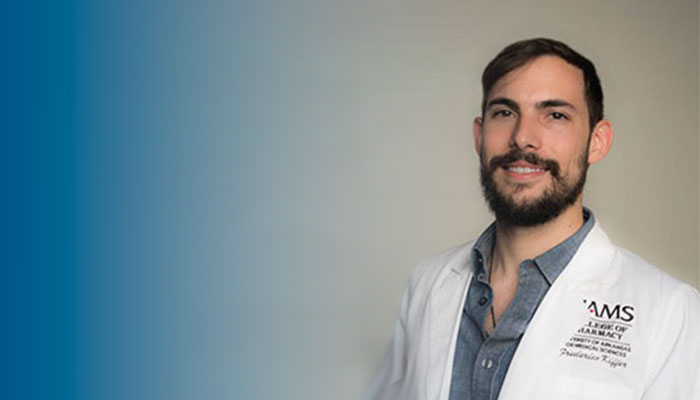HOW CAN WE HELP YOU? Call 1-800-TRY-CHOP
In This Section
Advancing Collective Knowledge: Q&A With Diversity Fellow Frederico Kiffer, PhD

Diversity Fellow Frederico Kiffer, PhD
Diversity and inclusion are critical drivers to our breakthroughs at Children's Hospital of Philadelphia Research Institute. Fostering a community of scientists from unique backgrounds and academic experiences enables collaboration to meet challenging pediatric problems from a variety of perspectives. In a Q&A series in the coming months, we're featuring five new scholars in the Postdoctoral Research Fellowship for Academic Diversity program at CHOP.
As a key part of CHOP's commitment to diversity, this fellowship funds talented researchers and educators from different backgrounds, races, ethnic groups, and other diverse populations. Join us to meet these fellows, learn more about their research interests, what diversity in science means to them, and how they enjoy spending their time outside of work. Our first featured Diversity Fellow Frederico Kiffer, PhD, always wanted to be a scientist, but never imagined a future where space research would inform cancer therapy.
Tell us about your background and what compelled you to apply for the Postdoctoral Research Fellowship for Academic Diversity.
I was born in Belo Horizonte, Brazil. Since I was a kid, I wanted to be a scientist, but I never dreamed that I would be conducting space and clinical research at an elite research institution. This is my fourth year as a postdoc, and through this time I’ve been a member of the Postdocs for Diversity in Science, where I’ve met the fantastic folks who run the Postdoctoral Research Fellowship for Academic Diversity program. In addition to the excellent faculty and staff, part of what makes this program so attractive is the well-rounded and personal career preparation support, which I haven't seen in many other fellowships or programs.What does diversity in research and science mean to you?
Diversity in research and science is the affirmation that bringing people of various backgrounds together increases points of view and enhances our ability to solve complex problems that advance our collective knowledge. Increased representation also exerts a multigenerational effect, where rising scientists see successful people who look and sound like them in positions of power and thus feel more welcome to envision themselves in such roles.
Frederico Kiffer, PhD, investigates how particle radiotherapy can improve therapeutic outcomes in an aggressive pediatric brain cancer.
What do you like the most about the Research Institute regarding inclusivity?
It’s really encouraging to see the time, effort, and resources dedicated by the Research Institute to advancement on this front. This kind of attention and investment at the trainee level are not only the morally correct decisions, they’re critical to paving a brighter path ahead.What are some research projects that you’re excited about?
I'm very excited to advance radiotherapy in juvenile and adult cancer models. The most exciting recent work in the field of radiotherapy is finding that delivering full doses in a fraction of a second yields a protective effect in normal tissues while maintaining or improving therapeutic efficacy relative to standard treatments. My current project leverages ultra-high dose rates to improve or maintain therapeutic efficacy while sparing non-cancerous tissues from radiation toxicities.What inspired you to choose your research focus, and what do you aim to achieve with your research?
Although I work on projects to understand and lower radiotherapy toxicities in the brain, the focus of my graduate research and earlier postdoctoral work has been to understand how space radiation impacts the brain and behavior to facilitate an eventual crewed mission to Mars. I am drawn to this work not only because I believe that the crewed mission to Mars will be one of humanity’s keystone achievements due to happen in my lifetime, I’m also excited by the unique obstacles encountered in the space environment and how solving these problems can have unexpected benefits on Earth.One example in my field is the increase in radiation pharmacological countermeasure and normal tissue toxicity research which is complementary to the field of particle radiotherapy. This is because novel cancer therapies use the same type of particle radiation encountered in interplanetary space. With my work, I aim to understand how particle radiotherapy can improve therapeutic outcomes in a model of medulloblastoma, the most common and aggressive childhood brain cancer.


